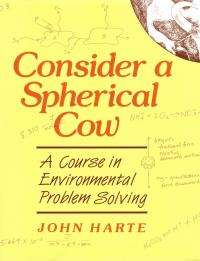Consider a Spherical Cow
Consider a Spherical Cow
By: John Harte
This book offers a variety of exciting techniques for approaching contemporary environmental problems, such as 'What was the pH of rainfall before the Industrial Revolution?'
For all sales outside of the United States, please contact Felicity Henson, fhenson@aip.org
Title information
This innovative compendium offers a variety of techniques for approaching contemporary environmental problems. Challenging, real-world situations and worked-out solutions provide the means both for gaining insights into the process of problem solving and for thinking quantitatively and creatively about such environmental concerns as energy and water resources, food production, indoor air pollution, acid rain, and human influences on climate.
1. Warm-Up Exercises
2.Tools of the Trade
A. Steady-State Box Models and Residence Times
B. Thermodynamics and Energy Transfer
C. Chemical Reactions and Equilibria
D. Non-Steady-State Box Models
3. A. Biogeochemistry
B. Climatology
C. Survival of Populations
Appendix: Useful Numbers
Glossary
Bibliography
Answers to Exercises; Index.
|
“Spherical Cow is an excellent guide to the very important art of quickly finding approximate answers to problems such as “what was the pH of rainfall before the Industrial Revolution?” This book illustrates step-by-step how to solve dozens of problems of this type.” “This book should be read and used by all students of environmental studies, and should be an important acquisition for any research, teaching, or general academic library.” |
John Harte
John Harte is a Professor of the Graduate School at the University of California, Berkeley. He did his undergraduate studies at Harvard and his PhD in theoretical physics at the University of Wisconsin. He has received a Guggenheim Fellowship, a Pew Scholars award, the Leo Szilard prize from the American Physical Society, and a George Polk award in investigative journalism. He is an elected Fellow of the California Academy of Sciences, the American Physical Society, the Ecological society of America, and the American Association for the Advancement of Science. He has also served on six National Academy of Sciences Committees and has authored over 250 scientific journal publications and eight books. John's research focuses on ecology, climate, complexity science, and environmental policy.

